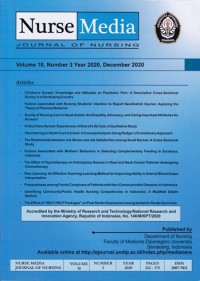
Jurnal
The Effect of “SELF-HELP Packages” on Post Stroke Depression among Ischemic Stroke Survivors
Background: There are several factors that contribute to Post Stroke Depression (PSD). Since a single intervention is proven ineffective to deal with PSD, an intervention which includes biological, psychological, social, and spiritual aspects (“SELF-HELP Packages”), therefore, needs to be established.
Purpose: The purpose of the study was to investigate the effect of “SELF HELP Packages” intervention on PSD among ischemic stroke survivors after three months from onset and its effect after confounding variables were controlled.
Methods: This study was a pre and post quasi-experiment with a control group involving 34 ischemic stroke survivors each group. The inclusion criteria were survivors after three months from ischemic stroke, no aphasia, having a good hearing, and having Mini Mental Status Examination (MMSE) score of ≥ 22. GRID-HAMD 17, Multidimensional Scale of Perceived Social Support (MSPSS), and Barthel-Index were used to measure PSD, social support, and functional status respectively. “SELF-HELP Packages” intervention was delivered in three sessions, namely information delivery, discussion and activity. Statistical analyses were conducted using McNemar test, Chi-square and logistic regression.
Results: The result showed that “SELF-HELP Packages” considerably decreased PSD in the intervention group (p=0.004). There were also significant differences in PSD after the intervention between two groups (p=0.008). Logistic regression showed that ‘SELF-HELP Package” had no effect on PSD when other confounding variables were controlled (p=0.075, OR=0.288, 95% CI 0.073 – 1.135).
Conclusion: SELF-HELP Packages” should be applied in providing the nursing intervention among stroke ischemic survivors in clinical setting. A longer period of time for the intervention is also recommended for the next study in order to obtain a more robust result.
Availability
No copy data
Detail Information
- Series Title
-
Nurse Media Journal of Nursing, Vol. 10 No. 3 December 2020
- Call Number
-
(05) 610.5 DEP n
- Publisher
- Semarang : Department of Nursing, Faculty of Medicine Diponegoro University., 2020
- Collation
-
Hlm. 361-375
- Language
-
English
- ISBN/ISSN
-
2087-7811
- Classification
-
(05) 610.5 DEP n
- Content Type
-
-
- Media Type
-
-
- Carrier Type
-
-
- Edition
-
Vol. 10 No. 3 December 2020
- Subject(s)
- Specific Detail Info
-
-
- Statement of Responsibility
-
-
Other version/related
No other version available
File Attachment
Comments
You must be logged in to post a comment
 Computer Science, Information & General Works
Computer Science, Information & General Works  Philosophy & Psychology
Philosophy & Psychology  Religion
Religion  Social Sciences
Social Sciences  Language
Language  Pure Science
Pure Science  Applied Sciences
Applied Sciences  Art & Recreation
Art & Recreation  Literature
Literature  History & Geography
History & Geography